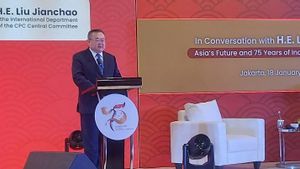JAKARTA - Japan's central bank or Bank of Japan (BoJ) maintained a very low interest rate at the meeting on Friday, March 9 local time.
The meeting was the last meeting chaired by Governor Haruhikomenda, who left a diverse legacy with a massive stimulus that was lauded for pulling the economy out of deflation - but suppressing bank profits and distorting market functions with prolonged low-interest rates.
His decision to postpone it made changes to the controversial bond yield control policy, leaving options open ahead of the leadership transition in April.
Many investors expect the central bank to stop controlling the yield curve (YCC) when its successor, Kazuo Ueda, took over the leadership in April.
"Ueda will not suddenly move and may wait until their second meeting in June, in changing future guidelines and the YCC," Masamichi Adachi, Japan's senior economist at UBS Securities.
"BoJ is likely to leave the target of a 10-year bond yield, while maintaining a negative interest rate, to hold the distortion on the yield curve," he said.
As expected broadly, BoJ maintains its short-term interest rate target at -0.1 percent and for 10-year bond yields of around 0 percent at the two-day meeting ending on Friday.
The central bank also did not change the range set around the 10-year yield target which allowed yields to rise to 0.5 percent.
"BoJ estimates the short-term and long-term policy interest rates remain at current or lower levels," BoJ said in a statement announcing the decision, maintaining its dovish guidelines on future policy channels.
Yen last fell by about 0.15 percent at 136.36 against the dollar, cutting losses after a spontaneous dip of 0.62 percent when some investors canceled bets made due to policy change expectations.
Japanese government bond yields (JGB) 10-years fell to 0.445 percent after the decision, the lowest since January 26, was stuck on the BoJ ceiling 0.5 percent.
BoJ maintains its view that Japan's economy is likely to recover. But it offers a more gloomy view than January on output and exports to say they are "moving side" due to recent weaknesses in factory production and foreign demand.
In January, the central bank said output and exports were increasing as a trend.
With inflation exceeding the target of 2.0 percent, BoJ has been forced to increase bond purchases to maintain the 0.5 percent limit set for a 10-year bond yield - at the expense of a yield curve shape and causing a dysfunction on the bond market.
Badminton has repeatedly said consumer inflation, now running double the BoJ target of 2.0 percent, will begin to slow down as the effects of spikes in fuel prices and raw materials in the past fade.
Data released on Friday showed Japan's wholesale price rose 8.2 percent in February from the previous year to mark a second straight month of year-on-year slowdowns, raising the chances of rising consumer inflation will start to moderate in the coming months.
In a parliamentary session last month, Ueda echoed a call for kinda to maintain a very loose policy. But the upcoming governor said he had an idea of how to get out of low interest rates, and was open to the idea of reassessing the current policy framework.
"Under Ueda, BoJ will switch to a phase where he sees the need to maintain a large stimulus, but not necessarily 'extraordinary' monetary support," said Hiroaki Muto, an economist at Sumitomo Life Insurance.
"After acknowledging the side effects of the YCC, Ueda may change or ignore the policy around June," he said.
The upper house of parliament on Friday approved the appointment of Ueda by the government and its two new deputies, Shinichi Uchida and Ryozo Himino, completing confirmation of the new BoJ leadership.
Ueda will chair its first policy meeting on April 27-28, when the council will produce new, closely watched quarterly growth and price forecasts until the 2025 fiscal year.
The English, Chinese, Japanese, Arabic, and French versions are automatically generated by the AI. So there may still be inaccuracies in translating, please always see Indonesian as our main language. (system supported by DigitalSiber.id)













